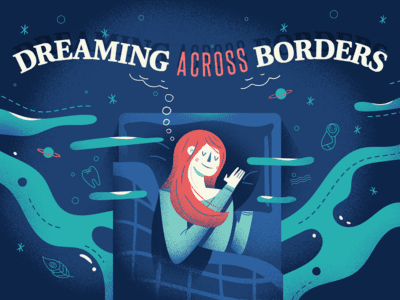In Poland, the ‘science’ of converting dream symbols into winning lottery numbers has endured since – well, the appearance of lotteries.
Gamblers and pseudoscientists hit the jackpot by publishing books that claimed to reveal the key between your dreams and the lucky numbers. A monkey in your dreams, apparently, foretells ‘love gone cold’ and the number 63.
Dream interpretation is big business because dreams are so mysterious and personal that we can’t help but search them for doom or hope. Your dream life is a one-person spiritual universe.
On the other hand, dream motifs recur from person to person and across cultures. Our dreams are shaped – in part, anyway – by our surroundings. So, if everyone in your country dreams of monkeys, it doesn’t mean 63 will come up on the National Lottery – but there’s a good chance you live in a country where monkeys are common.
Morning Life was curious which dreams were most common in different countries around the world. So, we analysed Google search data to see which dream symbols every country is searching for. And then we looked at what the most common dreams might mean. Scroll on to see what we found.
The World Dreams of Snakes
Our world map, below, shows the most commonly Google-searched dream in every country where data was available.
The world dreams of snakes. More countries most commonly dream of snakes than any other topic, and it is the most common in more than 1/3 of the countries we surveyed (52 out of 147). Snake dreams are particularly ‘popular’ across Eastern Europe and parts of Asia and Africa. The snake lends itself to symbolic interpretation, but, in the case of some snake-inhabited localities, sometimes a snake is just a snake.

At least snakes can crawl the other way. There’s no panic quite so real as the dream of losing your teeth. This is the second most prevalent dream in the world and is number one in 17 countries – mostly northern ones.
Perhaps the gloomy northern personality is to blame. One University of Colorado study found that tooth loss dreamers “were significantly more anxious and depressed, had lower ego strength, were less satisfied with their lives, felt they had less control over their lives, and felt helpless more often than the control subjects who dreamt of flight.”
The Most Common Dreams in the US and UK
Our next two charts show the ten most common dreams in the UK and US. Dreams of teeth falling out are significantly more common than any other kind of dream in both countries, particularly the UK. And both countries share snake dreams at number two. However, among terrifying snakes and spiders, the US dreams of ex-partners at number three – while Brits dream of hair.
The same dreams feature in different positions across much of the top ten for both countries. But for a clearer insight into the different psyches of the average UK and US inhabitant, we need to turn to the dreams that feature uniquely in one or the other table. This reveals that while Americans dream of vacations, bears, and being chased, Brits have pregnancy, birth, and fire on their (subconscious) mind.
The Five Most Common Dreams, Explained
We turned to dreammoods.com to provide speculative interpretations of the top five dreams in the world. The dream interpretation site uses a “psychological perspective or Freudian view” with an injection of mythological insight for its dictionary of common dream symbols.
Phallic, skin-shedding, poisonous, slippery, and smart, since biblical times, our slithery friend has represented the sacred and profane, life-giving medicine and certain death. So, while some dream experts point out that the context of the dream snake is what gives it meaning, you could equally argue the meaning is in the eye of the interpreter. For example, Cosmopolitan magazine suggests the snake “is your subconscious sending you a message that a person or situation you’re involved with is, well, pretty toxic.” That’s a pretty Cosmo way to look at things, really.
A World of Dreams
Local nature, culture, art, media, and events may ‘localise’ our dreams. But there’s another local culprit that could explain some differences: food. While only 17.8% of us believe that what we eat influences what we dream, the body and mind are closely interdependent – and those who eat fattier foods before they sleep enjoy a different quality of rest than those with more fruit and nuts in their diet. Could certain feelings and aftertastes suggest certain preferred themes for national dreams?
Check out our full data below!
METHODOLOGY & SOURCES
We found out which language is spoken predominantly in each country and used Google Translate to find out the word for dream in every language. Then we used Ahrefs to find the dream with the most Google searches in every country and US state. We used DreamMoods to research the meaning of each dream.






Mehmet Emre
Armenia and Georgia is in Europe, but Turkey is in the Middle East? Even Kazakhstan was included in the Middle East. Very interesting and admirable work, but very flawed mapping system. It’s illuminating to the depths of the subconscious, but should I travel through this mapping system to your subconscious? Congrats and thanks for your work.
Ken Hines
Never in my life have I dreamed of my teeth falling out. Now I probably will. Power of suggestion, is that how it works? Maybe the frequency of dental commercials on TV fits in there somewhere?
Brian
There is a huge self-selection bias in this data, as it is the dreams only of those who go to Google for dream interpretation. There is nothing to validate whether these are a representative cross-section of, well, people. It is quite likely that such a self-selection mechanism skews the results. However the results as presented are still fascinating.
sylvia
Agree! As the article says: tooth loss dreamers “were significantly more anxious and depressed, had lower ego strength, were less satisfied with their lives, felt they had less control over their lives, and felt helpless more often than the control subjects who dreamt of flight.” This certainly would correlate with a greater likelihood of these being the folks looking for answers on google. As interesting as this study is, as you say, “There is nothing to validate whether these are a representative cross-section of, well, people.”
Alan Wonderwheel
This is a fake interpretation of data. I have to say that I’m skeptical of the methodology. I mean, what does this sentence even mean? “Our world map, below, shows the most commonly Google-searched dream in every country where data was available.” Does that mean searches with the word “dream” are then analyzes to see what is the most common additional word? That doesn’t necessarily mean it was the person’s own dream. It doesn’t necessarily mean it was that person’s most common dream as it could be the most disturbing dream image, not the most common dream image. Etc. This is the kind of pseudo journalism using pop-statistical analysis with no basis in sociology, psychology, or anthropology.
Marah
BS
Ken Hines
Narcoleptics dream far more and more often than “normal”. They will likely have a dream during a five minute nap, several times a day, and most of the night. Maybe that population could shed light on all the speculation about dreams and their meanings, if there really is any.